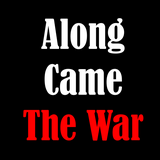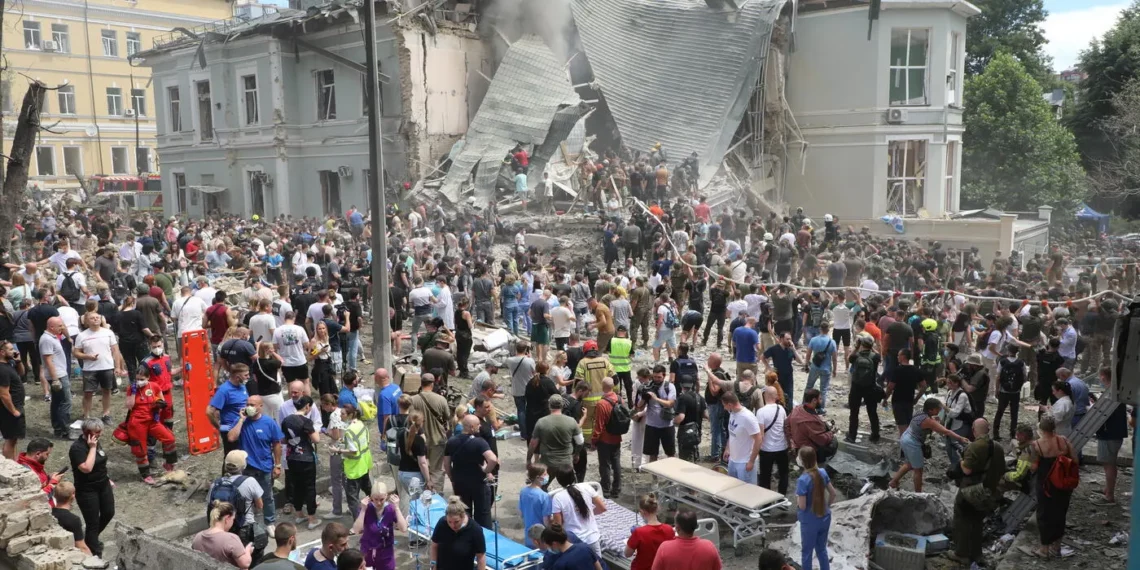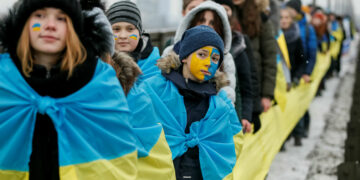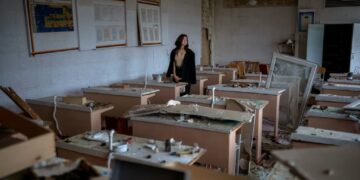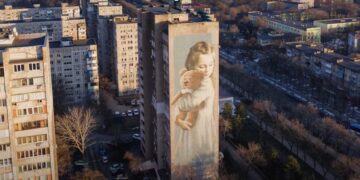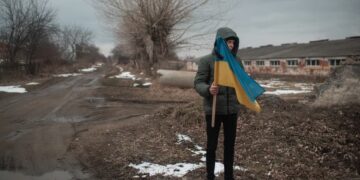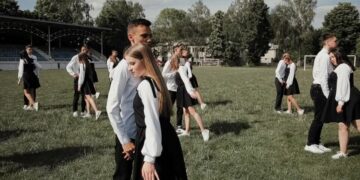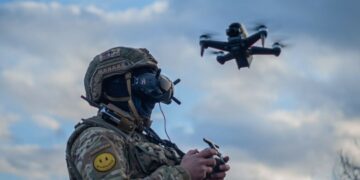Despite the violence and destruction, society emerged with significant legacies following the First and Second World Wars. These conflicts spurred numerous breakthroughs in technology and medicine, while also transforming diplomacy and politics. Today, the advancement of digital technology has redefined warfare and plays a leading role in various processes. As we reflect on the future, we ponder what legacies we might hope to gain from this war.
Veronika Shevych:
The first thing that comes to my mind is a higher level of patriotism: more and more people are speaking Ukrainian both at work and in their daily lives; we are trying to learn about our history, and our culture, which wasn’t spoiled by russian propaganda. Moreover, foreigners starting to learn about us and separate our nation from the russian one, Ukrainian mythology, culture, art, and music are spreading over the world, and there are even departments that study Ukraine in different universities. Furthermore, although it hurts to talk about it, I hope that we will learn how to accept people with otherness – with disabilities, PTSD, and different anxiety problems which we earned from war: unfortunately, after WWII Stalin, on the contrary, ashamed disabled people and tried to isolate them, so our society got non-perception to those who suffered, so we have to learn how to live with them and support them
Martha Shvets:
One of the legacies we already have is for sure media literacy. Hybrid war is a huge struggle in our day-to-day life right now, and since the global invasion started, we have addressed many propaganda attacks on our media space. With each hybrid attack, people are becoming more and more resilient to them. Ukrainians are practising their media hygiene, and although many people are still “buying” russian propaganda, the level of knowledge about media literacy among people is much higher, than it was three years ago.
Sophia Chornopolska:
The war in Ukraine has already changed the world around us drastically. Firstly, volunteering has become an essential part of our daily lives. Fundraising for Ukrainian army is everywhere: minibanks in Instagram stories, percentage from our tickets to theatre shows and literature evenings, charity events of all kinds. Many volunteer as a full-time job. People try to support each other whenever they can. Ukrainian culture, in particular folklore, is getting rediscovered and celebrated. But still, there is way more grief and struggle. Internally displaced people don’t always get enough financial support, demography is getting even worse, the entire population is struggling with traumas of different kinds, almost everyone has a friend or a relative who was killed by russian forces, and ecological catastrophes, for instance, the destruction of the Kakhovka Dam, don’t even get adequate level of acknowledgment in the West, which makes us feel alone and tired. There are a lot more troubles, like heavily mined territory and forcible transportation of children to russia. These are the problems with which we as a society will have to deal for many years to come. But while supporting each other, we’ll be able to do it.
Liza Shramko:
he word ‘legacy’ has a broad meaning to me. I guess the most evident legacy that we can leave is the cultural one. We live in a fast changing world where every small accomplishment might become significant. With the help of social networks and online platforms, people can create and spread any kinds of cultural content, even the most niche ones. And who knows? If there’s a proposition, demand might appear, too. Once people start looking for a certain kind of content, they will find it. That’s why creating and sharing is so important today, that’s why it becomes the part of our legacy. The more we create, the more we leave for our descendants. Consequently, they won’t have to search for content in foreign languages as much if we create it in Ukrainian.
Our cultural legacy can become our weapon. Russians once used their culture just the same way. They still do, in fact. But now they’ve got a strong opponent in the face of Ukrainians. The more we create, the stronger we become as a nation. Even now, we can offer an alternative to the Russian culture that plagued Ukrainian mindset for so many years. We still have much more work to do, yes, but once Ukraine becomes culturally strong enough, it will perish Russian influence. And that will be our legacy.
Sophia Samborska:
We as Ukrainians are traumatized enough to talk about so-called pros of the post-war consequences. Our only true legacy of this war should be people and culture. Even though our present is terrible, we must provide help and support to veterans and let them have a comfortable civil life. Our legacy should be inclusive urban infrastructure, honourable behaviour and affordable psychological aid. Not only we should take care of people who defended us, but also we should protect what they have defended — our culture. We have to have reformed educational system, protection of our historical heritage and support for artists and scientists. Even though war is terrible, we should survive it.
Alina Hostar:
I think that our the most developed legacy is an improved digital system that allows us to do simple things so much faster than most Europeans. Then it is our firmness and belief in a better future because without it, we wouldn’t have survived and stayed strong for so long. And lastly, it is our stubbornness in a good way. We won’t stop asking for more help, we won’t stop reminding about our country, we won’t stop explaining to the world that we exist. And if all this dream about high victory becomes reality, I would really want to see changes in our corrupted inner system. I think we need to have highly educated politicians that will be more like councils than aristocracy to us. Then changes need to be done in every sphere of the life of the country. It is really a long way to go, but it is necessary for the better world that we believe in.
Maria Klitynska:
I believe that major shifts will occur in our approach to communication as well as methods of memorialization. We will develop new ways of understanding the traumatic experience of war and normalize psychotherapy as one of the ways to improve the internal state of society. Also, an inclusive development model would be a big step, taking into account the number of people who have been physically affected by military actions. Another legacy will be a reformed system in many directions. The first thing that comes to mind is education. We are already seeing attempts to improve the education system in the country, and I am sure that it will scale up in the future. The experience of the war will also finally strengthen our military training, we will become a country that will possess military innovations that will help us in the future to protect our own autonomy, which, unfortunately, I think will still be encroached upon. Overall, I hope that the main legacy will be the unity of the people and a strong national consciousness and identity.
Denis Popov:
Another significant phenomenon about this war is the fact that this invasion happens to be the first full-scale invasion in Europe since 1945. Despite NATO and other alliances being, in a nutshell, not really useful, I still want to believe that war in Ukraine has reminded many of their members of real danger from the side of Russia and war itself and has activated their “self-protecting instincts”. I don’t want to sound naive and yet, I hope it will hold the next war in Europe for another decade (hopefully forever).
Viktoria Romas:
After the war, we will observe both negative and positive consequences. Among the positives is military experience and international support.
Ukraine has strengthened its defence abilities and has gained enormous experience in military operations. The world started talking about Ukraine, and Ukraine received a lot of help from allies. This can become important factors for preserving sovereignty and territorial integrity in the future.
The negative consequences of the war are economic and political instability, demographic crisis and psychological trauma.
Economic recovery will require many years and large investments. The post-war period can be accompanied by political instability due to the reconstruction of the country, the struggle for power and influence, and the need for reforms. Population loss due to migration and the death of a large proportion of youth, military and civilians could lead to a long-term demographic crisis.
Nastya Chepeleva:
The feeling of unity is a great tool we developed during the war. The phenomenon of volunteering has become our national success, which plays a significant role in resisting russia. I adore the statement that people who were injured during the war are going to become a great power for our country to proceed with new enthusiasm for life. However, our goal is to assist them in getting used to the new reality and civilian life. Because of war, we profoundly appreciate the moments of happiness we can find in tiny things. Due to the jeopardy of being destroyed, we have accumulated all our forces in all spheres. Many Ukrainians became acquainted with weapons, drones, military first aid, and also with the fact that every day our lives can be destroyed. Nevertheless, we are strong enough to encounter it, move on, and become more sophisticated.
Oleksandr Kravchenko:
The war in Ukraine has already left significant legacies and will likely lead to profound changes in the future. One of them, strengthening of national unity and a deeper sense of Ukrainian identity, as the war has united citizens in defence of their sovereignty. Our countries global recognition has increased, with the country emerging as a symbol of resilience and independence. Militarily, Ukraine has developed into a formidable force, pioneering innovative tactics and strategies. The humanitarian impact is substantial, with millions displaced, creating a lasting Ukrainian diaspora across the world. There’s also a revival of Ukrainian culture and language, with a renewed commitment to preserving the nation’s heritage.
Finally, a more robust civil society and democratic institutions could emerge, as Ukrainians push for governance reforms, transparency, and anti-corruption measures in the post-war period.
Maria Shcherbina:
Nowadays, during the war, we can observe different social processes and changes, such as numerous losses, deeper, depopulation and many others. Many buildings and even towns are destroyed, which means that in the future we will have to work on the rebuilding of our country. We will also have to pay attention to our ecological issues, most of which are caused by the war.
However, at the same time, there are also happening positive things. For example, there is an increase in the interest in Ukraine, it’s history, language and culture, which can be used as a way to attract tourists to our country in the future. Moreover, it is an opportunity to spread the knowledge about Ukraine, talk about our features and values and dreams.
Аnna Haidai:
When I ask myself whether we have developed anything during the war, I just try to keep silent. Mournfully. To be honest, the war has taken away our childhood. We all suddenly became grown up. You know, we once dreamed of growing up, but now we want to return to carefree childhood. I perceive this adulthood as a positive imprint of the war. Finally, we have realized that we are Ukrainians and have started to love ourselves for it! The youth has begun to be interested in the culture of the sixties, the history of Ukrainian cinema, and the fighting for the language. Now we are not reading Tolstoy, Pushkin, or Dostoevsky, but are trying to comprehend our own Ukrainian prose. We are trying to understand Kotsyubynsky when he writes about the shadows of forgotten ancestors, Khvylovyi when he says to go away from Moscow and look toward psychological Europe. We have started to value what we have and what our ancestors left for us. These changes fundamentally influence the fighting because Ukrainians realize that it is better to die than to stop being Ukrainian. On the other hand, a knife has been inserted into our society, dividing it into two different parts that cannot understand each other. One part knows what it’s like to lose people you love. The other part flees from death, trying to preserve both themselves and their families. Some take up arms, while others pack their bags and buy tickets abroad. This division cannot be overcome. Only tolerance for each individual’s choice can preserve our integrity as a nation.
